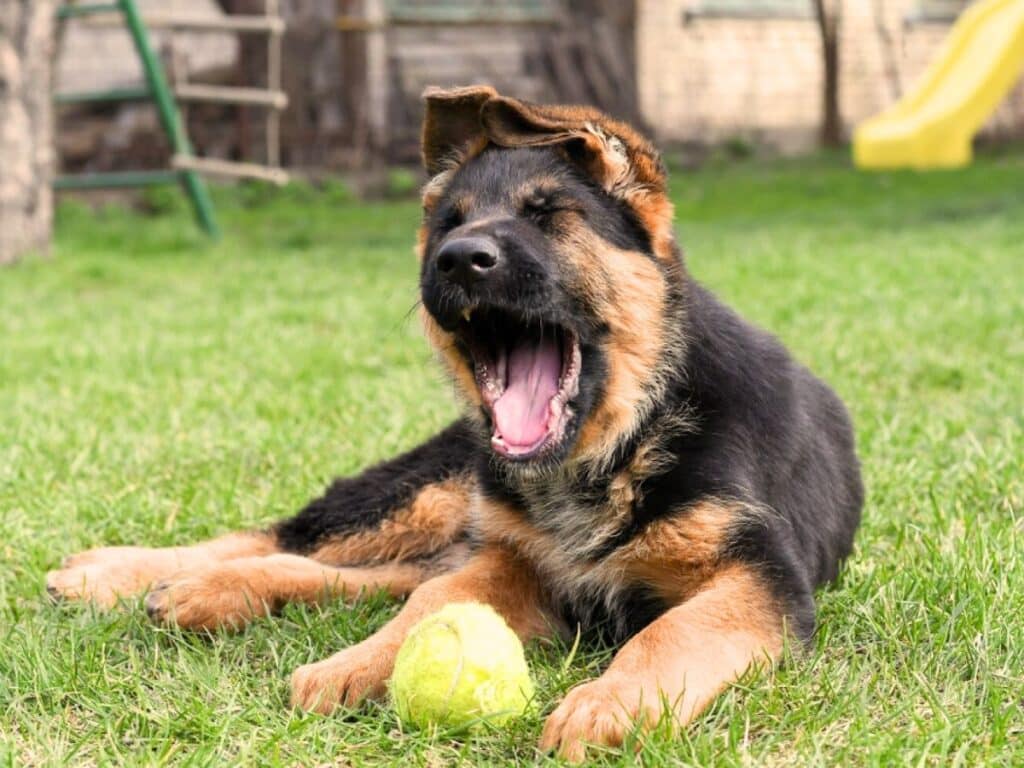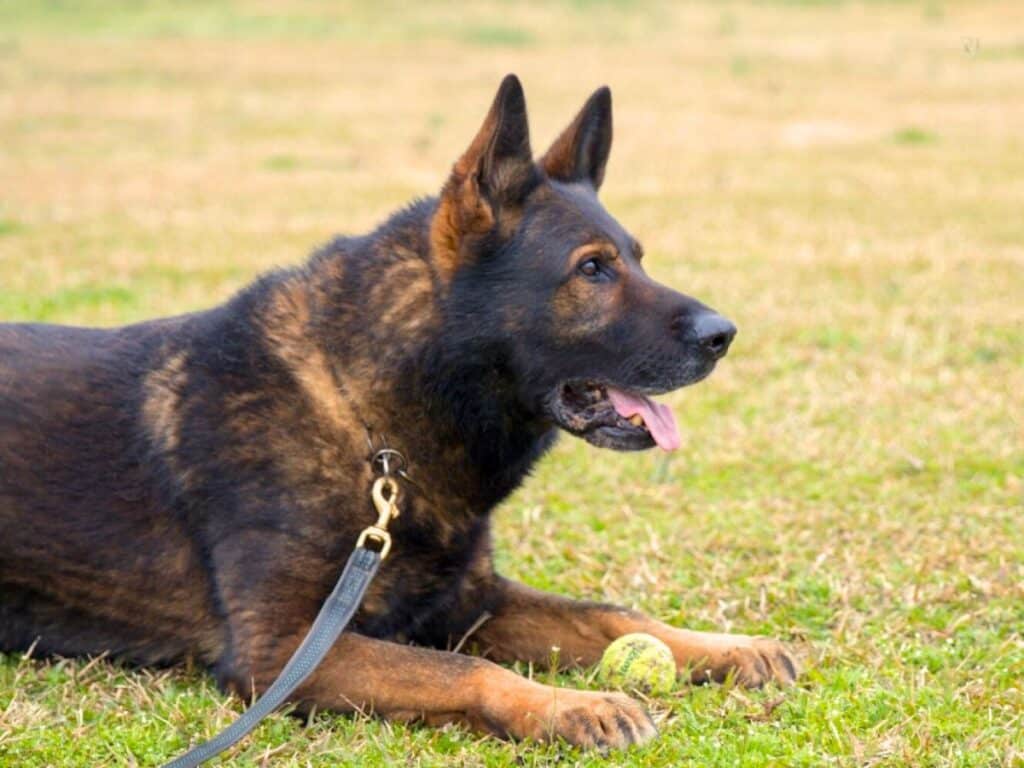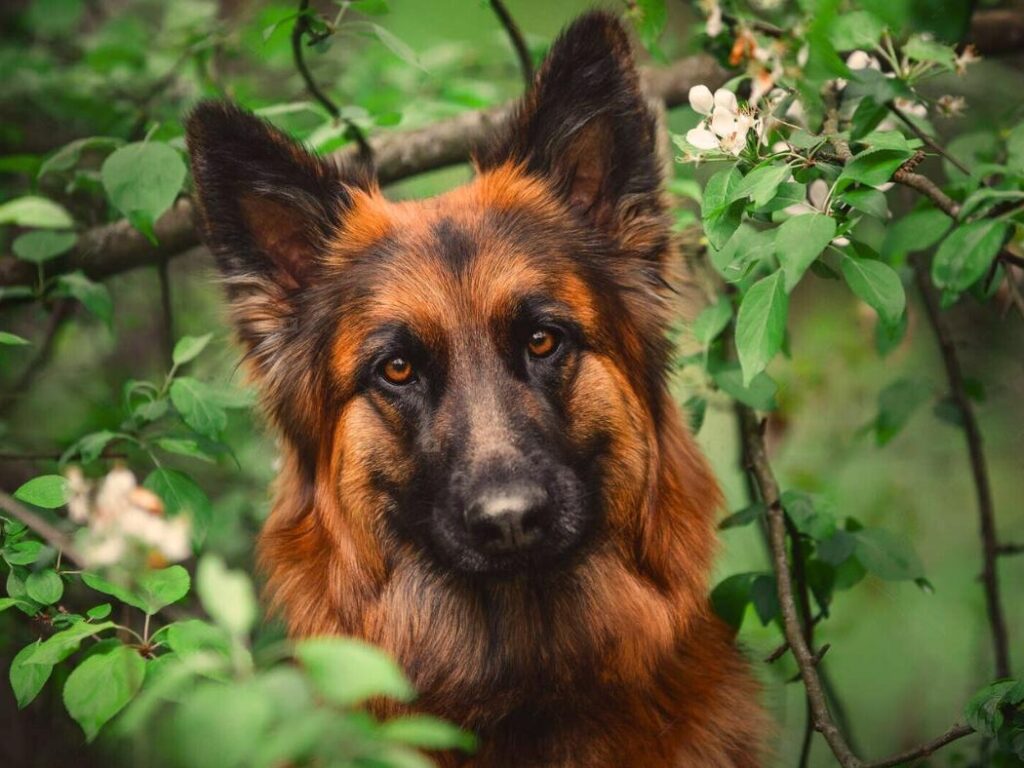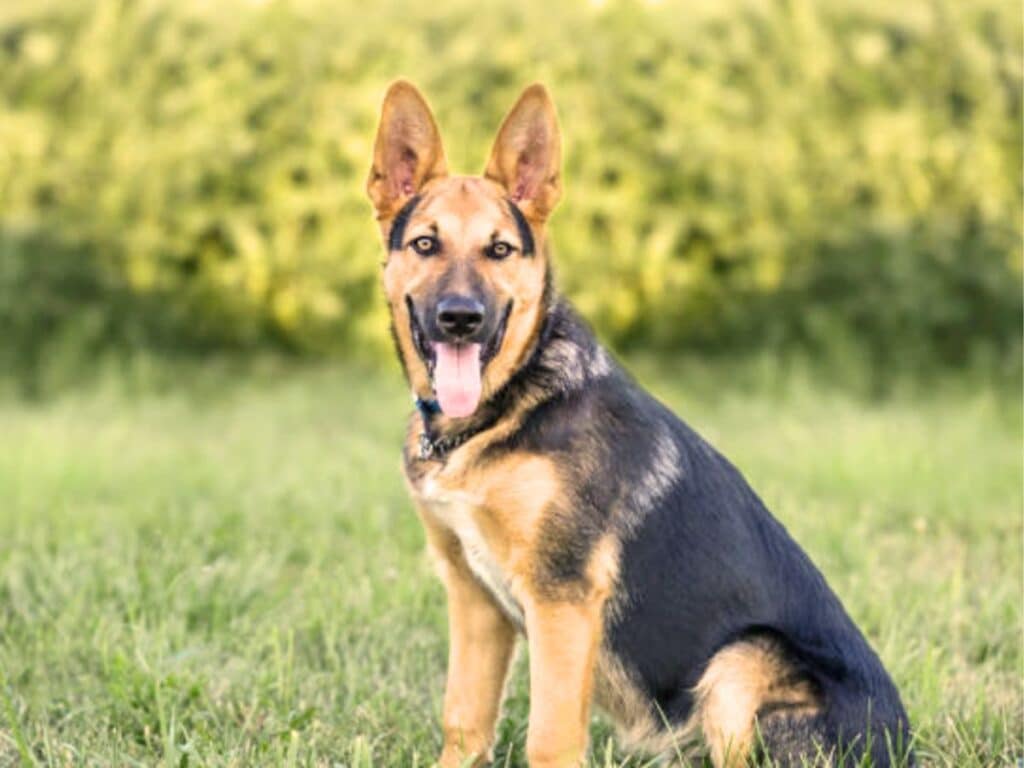So you have a 3 month old German Shepherd pup now! Well, I have been there myself.
These young dogs are full of energy and require plenty of attention and training during their early months to establish good behavior and habits.
So in this article, we will explore the joys and challenges of owning a 12-week-old pup, including their physical and behavioral development, training needs, socialization requirements, and more.
3 Month old German Shepherd Puppy
The following table offers a comprehensive overview of a 12-week-old German Shepherd, encompassing key aspects such as physical attributes, behavior, and essential traits, providing valuable insights into their developmental stage.
| Height | 8 – 11 inches |
| Weight | Typically around 17 – 30 pounds |
| Coat | Dense double coat with a straight or slightly wavy fur |
| Ears | May not be fully erect yet, possibly floppy |
| Eyes | Dark eyes, alert and expressive |
| Teething | In the process of teething, chewing on objects |
| Activity Level | High energy, playful, and curious |
| Socialization | Developing social skills, may be cautious around new people/dogs/situations |
| Training | Basic commands like sit, stay, and come are being introduced |
| Bite Inhibition | Learning bite inhibition, may play-bite during play |
| Sleep Pattern | Requires several naps throughout the day, around 14-18 hours of sleep |
| Feeding | 3-4 meals a day, transitioning to solid puppy food |
| Healthcare | Should have received initial vaccinations and deworming. |
| Playtime | Enjoys interactive play, toys, and short walks |
| Bonding | Developing a strong bond with owners and family members |
| Curiosity | Curious about the environment, exploring the surroundings |
To learn more about the vaccinations for your pup, please refer to my article: German Shepherd Dog Vaccination Schedule.

3 Month Old German Shepherd Weight
At three months old, German Shepherds on average weigh between 17 to 30 pounds. Their weight can vary based on factors such as genetics, diet, and exercise.
Keep in mind that individual puppies may have slight variations in weight based on factors such as genetics, diet, and overall health.
It’s essential to monitor their weight regularly to ensure they are growing at a healthy rate. Providing proper nutrition is crucial for their development at this stage. Regular veterinary check-ups can help ensure that a puppy is growing at a healthy rate.
How Big is a 3 Month Old German Shepherd?
At three months of age, a German Shepherd puppy is typically in the range of 8 to 11 inches in height at the shoulder. Again, individual puppies may vary, and these measurements are general estimates.
German Shepherds are a medium to large breed, and their growth rate is relatively fast during the puppy stage. Regular veterinary check-ups can help monitor their growth and overall health.
To learn more about the key developmental milestones (height, weight, etc.) as your pup grows and matures, please refer to my article: German Shepherd Growth Chart By Month

What Does a 3 Month Old German Shepherd Look Like?
At this age, a German Shepherd puppy is in the midst of its adorable and dynamic puppy stage. Here’s a description of what a 3-month-old German Shepherd typically looks like:
- Size and Proportions: The puppy is medium-sized, with a well-proportioned body. While still a puppy, they will have a somewhat lanky appearance as their limbs are still growing.
- Coat: The German Shepherd puppy has a dense double coat, which is a characteristic feature of the breed. The fur may be straight or slightly wavy. The distinctive markings on the face and body are starting to become more pronounced.
- Ears: The ears may or may not be fully erect yet. At three months, some puppies still have floppy ears, while others may be starting to stand up.
- Eyes: The puppy’s eyes are usually dark in color, and they are alert and expressive, reflecting the curiosity and energy typical of this stage.
- Teething: A 3-month-old GSD is likely in the teething phase, and you may observe the puppy chewing on various objects to alleviate discomfort.
- Movement: The puppy is becoming more coordinated and agile. You’ll notice increased mobility and playfulness as it explores its environment.
Feeding Your 3 Month Old German Shepherd Pup
Feeding a 12 week old German Shepherd puppy requires careful consideration of their nutritional needs. At this age, your puppy is still growing and developing, so it’s essential to provide them with a balanced and appropriate diet.
How Much Should a 3 Month Old German Shepherd Eat?
At three months old, German Shepherd puppies typically eat about 2 – 3 cups of puppy food spread over 3 to 4 meals per day.
The exact portion size depends on the specific brand and type of puppy food you’re using. It’s crucial to follow the feeding guidelines provided on the dog food packaging. These guidelines are often based on the puppy’s weight.
However, keep in mind that each puppy is unique, and their individual needs may vary. It’s important to monitor your puppy’s weight and adjust their portion sizes accordingly.
If you notice they are gaining too much weight, reduce the amount of food you are feeding them. On the other hand, if they are not gaining enough weight, you may need to increase their portion sizes.
RELATED: German Shepherd Puppy Feeding Chart By Age

What Does a 3 Month Old German Shepherd Eat?
A 3-month-old German Shepherd should eat high-quality puppy food, specifically formulated for large breeds. Provide 3-4 meals daily, totaling 2-3 cups. Ensure a balanced diet with protein (22-32%), fat (8-12%), and essential nutrients. Consult your vet for personalized recommendations.
Puppy Food
Choose a high-quality puppy food specifically formulated for large breeds. Look for options that meet the nutritional standards set by organizations like the Association of American Feed Control Officials (AAFCO).
The puppy food should contain essential nutrients like protein, fat, carbohydrates, vitamins, and minerals.
Frequency of Meals
At three months old, puppies typically need to eat more frequently than adult dogs. Aim for three to four meals per day to ensure they receive enough nutrients and energy throughout the day for their rapid growth.
Protein and Fat Content
Choose a puppy food with adequate levels of protein and fat to support muscle development and provide energy. Look for foods with around 22-32% protein and 8-12% fat.
Transitioning to Solid Food
Gradually transition your puppy from the milk or puppy formula to solid food. Mix a small amount of the new puppy food with the old formula, and gradually increase the ratio over several days to allow the puppy’s digestive system to adjust.
Hydration
Always provide access to clean and fresh water. Proper hydration is crucial for a puppy’s well-being.
RELATED: How Much Water Do German Shepherds Drink in a Day?
Avoid Certain Ingredients
Avoid feeding your German Shepherd puppy human food, especially items like chocolate, onions, garlic, and anything containing caffeine. These can be toxic to dogs.
To learn more about the safe and unsafe foods for German Shepherds, you should check out my article – What Do German Shepherds Eat? It has an exhaustive list of foods that GSDs can and can not eat.
If you’re planning to feed your pup fruits as a treat then don’t forget to go through my article – 39 Fruits That German Shepherds Can Eat & 14 That They Can’t

Training a 3 Month Old German Shepherd
Training a 3-month-old German Shepherd involves laying the foundation for basic obedience, socialization, and good behavior. Here’s a step-by-step guide to help you with the training process:
Start with Basic Commands
- Sit: Hold a treat above your puppy’s head, and as they naturally sit down, say “sit” and reward them.
- Stay: Begin with short durations, ask your puppy to stay, take a step back, then return and reward. Gradually increase the time and distance.
- Come: Use a happy tone and crouch down, encouraging your puppy to come to you. Reward them when they do.
RELATED: German Shepherd Training for Beginners
Positive reinforcement
- Use treats, praise, and play as rewards for good behavior.
- Be consistent with rewards to reinforce positive actions.
- Ignore or redirect unwanted behavior rather than punishing.
Socialize your pup
- Introduce your puppy to various environments, people, and other animals.
- Expose them to different sounds, surfaces, and experiences to build confidence.
- Supervise interactions to ensure positive experiences.
RELATED: How To Socialize Your German Shepherd Pup
Leash training
- Introduce your puppy to a leash and collar. Allow them to get used to the feeling by letting them drag it around under supervision.
- Practice short walks in a quiet, familiar environment. Reward them for walking beside you without pulling.
RELATED: How To Leash Train Your GSD

Crate training
- Introduce your puppy to a crate as a safe and comfortable space. Make it a positive experience by placing treats and toys inside. (Source)
- Gradually increase the time your puppy spends in the crate, associating it with positive experiences.
RELATED: How To Crate Train A German Shepherd Puppy
Potty training
- Establish a consistent schedule for bathroom breaks, especially after meals, waking up, and playtime.
- Use a designated outdoor area for potty breaks. Praise and reward your puppy when they eliminate in the correct spot.
RELATED: How To Housetrain a German Shepherd Puppy
Enroll in puppy classes
- Puppy classes offer professional guidance and provide opportunities for socialization.
Remember, patience and positive reinforcement are essential when training a puppy. Keep training sessions short and fun to keep your puppy engaged and eager to learn. If you encounter challenges, consult with a professional dog trainer for personalized advice.
If you don’t know how to make your dog listen to you or you want your dog to stop biting, digging, jumping up all the time, or Potty train him/her within a couple of weeks? Then check out this Brain Training Course For German Shepherds. This course features 21 games to improve a dog’s intelligence & behavior, plus easy instructions for training obedience commands.

Exercising Your 3 Month Old German Shepherd
Exercising a 12-week-old German Shepherd puppy is important for their physical and mental development. However, it’s crucial to be mindful of their age and not overexert them.
How Much Exercise Does a 3 Month Old German Shepherd Need?
As a general guideline, a 3-month-old German Shepherd puppy needs about 15-30 minutes of play and moderate exercise spread throughout the day with ample time to rest and sleep in between exercise sessions.
The exercise needs of a puppy at this age should be approached with caution, as their bones and joints are still developing.
While they have plenty of energy, it’s essential to provide age-appropriate exercise to prevent overexertion and potential joint problems later in life.
RELATED: How Much Exercise Does a German Shepherd Puppy Need?
How Far Can a 3 Month-Old German Shepherd Walk?
Typically, a 3-month-old German Shepherd puppy can handle short walks of about 10 to 15 minutes once or twice a day. This can be gradually increased as the puppy grows.
Pay attention to your puppy’s behavior during walks – if they show signs of fatigue, such as slowing down, sitting, or lagging behind, it’s essential to let them rest.
A general guideline for walking a young GSD puppy is to keep the walks short and age-appropriate.
RELATED:
- 14 Week Old German Shepherd: Size, Nutrition & More
- 4-Month-Old German Shepherd: Everything You Need To Know
Exercising Guidelines
Here are some guidelines for exercising a 3-month-old German Shepherd:
Short, Frequent Sessions:
- Puppies have lots of energy but limited endurance. Plan short exercise sessions multiple times a day.
- Aim for 5-10 minutes of play for every month of age, a few times a day.
Playtime:
- Engage in interactive play with toys, such as tug-of-war or fetch.
- Use toys that encourage mental stimulation, like puzzle toys and treat-dispensing toys.

Basic Obedience Training:
- Incorporate training exercises into playtime to stimulate their minds and strengthen the bond between you and your puppy.
Gentle Walks:
- Short, controlled walks on a leash can help your puppy get used to the idea of walking and reinforce leash training.
- Avoid long walks or intense exercise to protect their developing joints.
Off-Leash Play in Safe Areas:
- Allow your puppy to explore and play in a secure, fenced area.
- Ensure the environment is safe from hazards and that other dogs are friendly.
Interactive Games:
- Play games that encourage mental stimulation, like hide-and-seek or scent games.
Avoid High Impact Activities:
- Jumping and high-impact activities can be harmful to a puppy’s growing joints. Avoid activities like jumping off high surfaces or excessive stair climbing.
Always pay attention to your puppy’s behavior. If they show signs of fatigue, it’s important to allow them to rest. As your puppy grows, you can gradually increase the duration and intensity of exercise.

3 Month Old German Shepherd Behavior
The behavior of a 12-week-old German Shepherd puppy is characterized by a delightful blend of curiosity, playfulness, and rapid learning. At this age, German Shepherd puppies are in the early stages of socialization and development, exhibiting several distinctive behaviors:
Curiosity and Exploration
- Playful Investigator: A young GSD pup is naturally curious about the world around them. They explore their environment with enthusiasm, using their nose, mouth, and paws to interact with various objects.
- Interest in Sounds and Smells: Puppies at this age are highly receptive to new sounds and smells. They may express curiosity by tilting their heads, pricking their ears, or sniffing extensively to gather information about their surroundings.
Social Interaction
- Bonding and Affection: German Shepherds are known for their loyalty, and at 3 months old, they start forming strong bonds with their human family. Expect affectionate behaviors, such as nuzzling, licking, and seeking physical closeness.
- Playful Interactions: Puppies love to play, and German Shepherds are no exception. They engage in playful activities like chasing, wrestling, and interactive games. This play not only helps them develop physically but also strengthens their social skills.
Teething and Chewing
- Around 3 months, puppies may experience teething discomfort. They may chew on various objects to alleviate this discomfort. Providing appropriate chew toys can help redirect this behavior to more acceptable outlets.
Energy Bursts and Napping
- High Energy Periods: German Shepherd puppies have bursts of energy but tire quickly. Short bursts of play, training, and exploration are followed by a need for naptime to recharge.
- Establishing a Routine: Puppies thrive on routines. Establishing a consistent schedule for feeding, play, and rest helps them feel secure and aids in-house training.
How Much Does a 3 Month Old German Shepherd Sleep?
On average, a 3-month-old German Shepherd might sleep anywhere from 14 to 18 hours per day. However, the exact amount of sleep can vary from one puppy to another.
Puppies go through periods of intense activity, play, and exploration, but they also need plenty of rest to support their rapid growth and development. It’s not uncommon for a puppy to take short naps throughout the day, interspersed with periods of play and interaction.
RELATED: How Much Do German Shepherd Puppies Sleep?
Check out this video of a cute 3 month old German Shepherd undergoing training…

How To Stop 3 Month Old German Shepherd From Biting
Biting is a common behavior in puppies, including 3-month-old German Shepherds, as they explore the world and interact with their environment. Puppies use their mouths to play, chew, and learn about their surroundings.
Here are some tips to address and manage biting behavior in your pup:
- Provide Appropriate Chew Toys:
- Ensure your puppy has a variety of safe and appropriate chew toys to redirect their biting behavior. This helps satisfy their natural urge to chew and provides an acceptable outlet for their biting instincts.
- Use Positive Reinforcement:
- When your puppy is playing appropriately or chewing on a toy, praise and reward them. Positive reinforcement helps reinforce desirable behaviors.
- Redirect and Distract:
- If your puppy starts biting you or inappropriate objects, redirect their attention to a toy. Gently guide their focus away from your hands or clothing, and offer the toy as an alternative.
- Yelping or Ignoring:
- Mimic the behavior of a littermate by yelping softly when bitten. This signals that the bite was too hard, and it can teach your puppy to use a softer mouth during play. If biting persists, withdraw your attention by ignoring the puppy briefly.
- Consistent Commands:
- Use consistent commands, such as “gentle” or “no bite,” to communicate that biting is not acceptable. Be patient and repetitive in reinforcing these commands.
- Seek professional help if needed:
- If your pup’s biting behavior persists or becomes aggressive, it may be necessary to consult a professional dog trainer or behaviorist.
It’s important to be patient and consistent in addressing biting behavior. Puppies are learning, and positive reinforcement, combined with redirection and appropriate toys, helps shape their behavior over time.
RELATED: How To Stop German Shepherd Puppy From Biting

How to Take Care of a 3 Month Old German Shepherd
Taking care of a 12-week-old German Shepherd involves providing proper nutrition, veterinary care, socialization, training, and a safe environment. Here’s a comprehensive guide to help you care for your 3-month-old German Shepherd:
- Veterinary Care:
- Schedule regular veterinary check-ups for vaccinations, deworming, and general health assessments.
- Discuss a suitable vaccination schedule with your vet.
- Ask about preventive measures for fleas, ticks, and other parasites.
- Nutrition:
- Feed your puppy a high-quality puppy food recommended by your veterinarian.
- Follow the feeding guidelines on the puppy food packaging based on your puppy’s age, weight, and breed.
- Provide fresh water at all times.
- Feed your 3-month-old German Shepherd 3 to 4 times a day.
- Establish a consistent feeding schedule to help with potty training.
- Potty Training:
- Take your puppy outside frequently, especially after eating, drinking, or waking up.
- Praise and reward them when they eliminate outside.
- Be patient and consistent in your approach to potty training.
- Crate Training:
- Introduce your puppy to a crate for a safe and secure space.
- Use positive reinforcement to create positive associations with the crate.
- Gradually increase crate time.
- Socialization:
- Expose your puppy to various people, environments, and other animals.
- Arrange playdates with other well-vaccinated and friendly dogs.
- Introduce your puppy to different sounds, surfaces, and experiences.
- Basic Obedience Training:
- Begin basic obedience training, teaching commands like “sit,” “stay,” and “come.”
- Use positive reinforcement, such as treats and praise, to reward good behavior.
- Keep training sessions short, fun, and consistent.
- Exercise:
- Provide age-appropriate exercises, such as short walks, play sessions, and interactive games.
- Avoid high-impact activities that may strain developing joints.
- Chew Toys:
- Provide a variety of safe and appropriate chew toys to alleviate teething discomfort.
- This study suggests that you should rotate toys to keep your puppy engaged and prevent boredom.
- Grooming:
- Start getting your puppy used to grooming activities like brushing, nail trimming, and ear cleaning.
- Brush your puppy’s teeth regularly to promote good dental health.
Remember, each puppy is unique, so adjust your care routine based on your German Shepherd’s individual needs and preferences. Regular vet visits, positive reinforcement, and a loving environment contribute to a healthy, well-adjusted, and happy puppy.
RELATED: Common German Shepherd Health Issues: Symptoms & Treatments

3 Month Old German Shepherd Ears Not Up
At 12 weeks old, it is not uncommon for a German Shepherd’s ears to not be fully upright. The ears of a German Shepherd typically start to stand up between 4 to 7 months of age.
It’s important to remember that ear shape and development can be influenced by genetics. Some German Shepherds may have naturally floppy ears or ears that take longer to stand up.
If your puppy’s parents have upright ears, there is a good chance that your puppy’s ears will eventually stand up as well.
However, if you are concerned about your German Shepherd’s ears not being up, here are a few tips to encourage proper ear development:
- Massage the Base of the Ears: Gently massage the base of the puppy’s ears to stimulate blood flow to the cartilage. This can sometimes help the ears stand up.
- Provide a Balanced Diet: Ensure your puppy is receiving a well-balanced diet with proper nutrition. Sometimes, nutritional deficiencies can affect ear development.
- Be Patient: It’s normal for ears to take several months to stand up fully. Some German Shepherds may not have fully erect ears until they are six months or older.
If you are concerned about your puppy’s ear development, or if their ears haven’t shown any signs of standing up by six months of age, it’s advisable to consult with your veterinarian.
RELATED:
Closing Thoughts
You’ve now got the lowdown on raising a 3-month-old German Shepherd. From feeding and training to handling behavior and care, you’re well-equipped to give your furry friend the best start in life. Remember, consistency is key and patience pays off when dealing with behavior issues. Keep an eye on those ears – they’ll perk up in their own good time! Now go show your pup some love and watch them grow into a loyal and well-behaved companion.
Frequently Asked Questions
1. How long can a 3-month-old German Shepherd hold its bladder?
On average, a 3-month-old German Shepherd can hold its bladder for about 1 to 2 hours. However, this may vary, and it’s crucial to take them outside frequently, especially after meals, naps, and playtime.
3. What to expect from a 3-month-old German Shepherd?
At 3 months, expect a curious and playful puppy. They’ll be teething, exploring, and showing interest in basic training. Provide socialization, age-appropriate exercise, and a consistent routine to foster a well-adjusted and happy companion.
4. What size harness for a 3-month-old German Shepherd?
For a 3-month-old German Shepherd, choose a harness designed for medium-sized breeds. Measure your puppy’s girth and consult the sizing chart provided by the harness manufacturer to ensure a snug and comfortable fit. Adjust the harness as your puppy grows.




